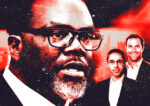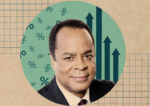Chicago’s real estate industry may have to gear up for a fight against a transfer tax hike that would quadruple the city’s bite out of the priciest deals straight to the voters.
Alderman Carlos Ramirez-Rosa of the 35th Ward, and Mayor Brandon Johnson’s floor leader of the city council, claimed Thursday that there’s enough support on the council to pass the mayor’s proposed graduated transfer tax, Crain’s reported. He declined to provide a vote count, however, the publication reported.
The resolution presented this week to the City Council outlines a plan to fund permanent affordable housing development through revenue generated by increased real estate transfer tax. This move follows adjustments to the original proposal, which initially sought to impose a flat tax increase on property sales over $1 million. Concerns over potential legal challenges prompted the adoption of a graduated tax rate structure.
Under Johnson’s revised plan, property sales under $1 million will see a 20 percent reduction in the transfer tax rate to 0.6 percent of the sale price, while it would rise to 2 percent for deals between $1 million and $1.5 million and 3 percent — four times the current rate — for sales of more than $1.5 million. The uppermost rate is more expensive for big building owners than a previously considered plan that would have taken the tax rate to 2.65 percent of the sale price for all deals of $1 million or more.
Chicago’s commercial real estate industry has voiced opposition to the proposal, citing concerns about timing. Business groups have argued that the tax increase comes at a challenging moment when commercial real estate sales are still recovering from the pandemic’s impact.
Mayor Johnson’s budget forecast for 2024 anticipates a $42.2 million deficit, or 5.2 percent in transfer tax revenue, primarily attributed to the slowdown of the real estate market. This year, the tax is estimated to end the year 37.1 percent, or $82.1 million, under budget due to a dropoff in market activity.
Alderwoman Maria Hadden, of the 49th Ward, voiced her support during a rally for the resolution, and emphasized the need to find funding for services for the city’s homeless population.
Hadden acknowledged the reluctance to raise property taxes but argued that there are limited methods to generate more funding available to the city.
The City Council referred the resolution to the Rules Committee, a standard procedure for measures that must be referred to voters to become law.
The Rules Committee will determine whether to pass the referendum proposal to the Chicago Board of Elections. If approved, the referendum will appear on the ballot in March, allowing voters to decide on granting the City Council the authority to increase the transfer tax.
Read more



